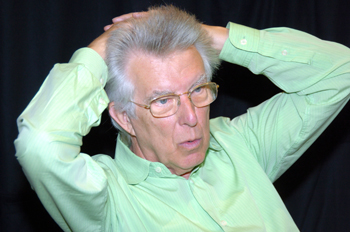

| Roger Reynolds was born on 18
July 1934 in Detroit, Michigan. He was educated in music and science at the
University of Michigan, when he co-founded the ONCE Festivals. His aesthetic
outlook was jointly shaped by the American Experimental tradition and - through
his teachers Ross Lee Finney
and Roberto Gerhard - also by the Second Viennese School. Reynolds refuses
categorization, responding to the variety of the contemporary world with
a uniquely diversified output - music now increasingly concerned with myth,
text and space-ranging from the purely instrumental and vocal to involvements
with computers, video, dance and theater. His multicontinental career - in
Europe, South America, Asia, and the Nordic countries, as well as the United
States - centers on composing, but includes writing, lecturing, organizing
musical events, and teaching. Reynolds has been honored by the prestigious
Pulitzer Prize and the National Institute of Arts and Letters, and by commissions
from the British Arts Council, Radio France, the BBC, the Suntory and Koussevitzky
foundations, and the National Endowment for the Arts. He is a member of the
faculty at the University of California, San Diego, where he was the founding
director of the Center for Music Experiment (now CRCA). Writing in The
New Yorker, Andrew Porter
called him "at once an explorer and a visionary composer, whose works can
lead listeners to follow him into new regions of emotion and imagination." More information, photos, videos, recent premiers, thoughts, etc., can be found on his official website. == Names which are links in this box and below
refer to my interviews elsewhere on my website. BD
|
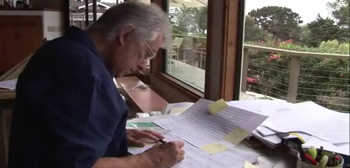 BD: Does this in any way affect you when you're
at your desk putting notes on paper?
BD: Does this in any way affect you when you're
at your desk putting notes on paper?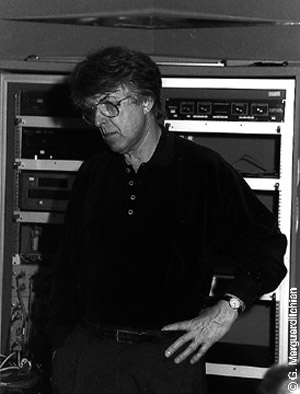 RR: Well, those are two questions which are quite
unrelated, I think. First, I begin with recorded real sound, so the
question of trying to work towards a complex sound is simply obviated.
I don't encounter it because I don't go for synthetic sound. I have
done only one piece with synthesized sound. When I first went to Stanford
University in the late '70s to explore the application of computers to music,
I realized right away that there were going to be two roads. One was
processing of natural sound, and the other was the creation of synthetic
sound. I tried a piece in both ways during the first year that I worked
in it, and decided fairly decisively at that point not to go on with synthetic
sound. That might change at some point, but right now it's not what
I do. The other problem was that one of the difficulties that the introduction
of electronics into music brought with it was that in theory, the system
— the approach — was entirely general.
But in the absence of models, it turned out to be very difficult to "imagine"
a sound that was not like sounds we already knew. In fact a colleague
of mine, Robert Erickson,
published a book in which he asserted that the primary families of sound
already existed in the sections of the orchestra. I'm not sure that
I agree with him, but I do agree, certainly, that models, which is to say
images or perhaps montages of images, do. But in any case, the existence
of some kind of sonic experience is a critical matter when you begin to try
to work in what is supposedly a free field.
RR: Well, those are two questions which are quite
unrelated, I think. First, I begin with recorded real sound, so the
question of trying to work towards a complex sound is simply obviated.
I don't encounter it because I don't go for synthetic sound. I have
done only one piece with synthesized sound. When I first went to Stanford
University in the late '70s to explore the application of computers to music,
I realized right away that there were going to be two roads. One was
processing of natural sound, and the other was the creation of synthetic
sound. I tried a piece in both ways during the first year that I worked
in it, and decided fairly decisively at that point not to go on with synthetic
sound. That might change at some point, but right now it's not what
I do. The other problem was that one of the difficulties that the introduction
of electronics into music brought with it was that in theory, the system
— the approach — was entirely general.
But in the absence of models, it turned out to be very difficult to "imagine"
a sound that was not like sounds we already knew. In fact a colleague
of mine, Robert Erickson,
published a book in which he asserted that the primary families of sound
already existed in the sections of the orchestra. I'm not sure that
I agree with him, but I do agree, certainly, that models, which is to say
images or perhaps montages of images, do. But in any case, the existence
of some kind of sonic experience is a critical matter when you begin to try
to work in what is supposedly a free field.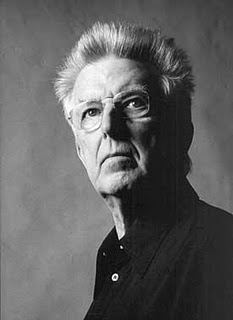 BD: But there wasn't this huge rejection of the
new; there was still a sense of, "Well, maybe it'll eventually sort of seep
in," and it eventually did kind of seep in.
BD: But there wasn't this huge rejection of the
new; there was still a sense of, "Well, maybe it'll eventually sort of seep
in," and it eventually did kind of seep in.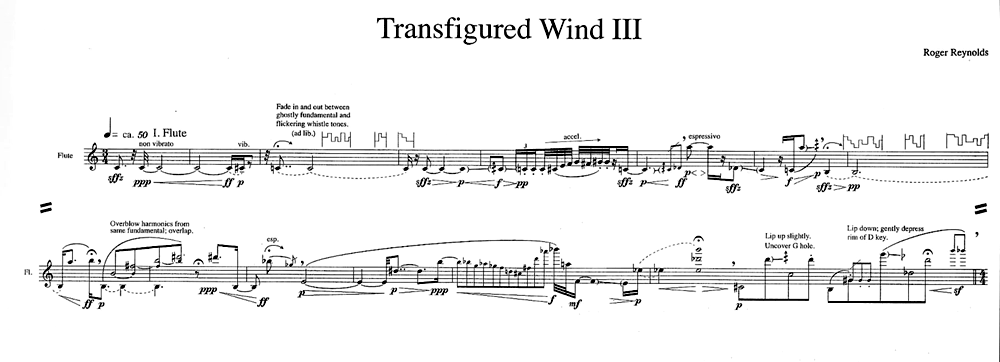
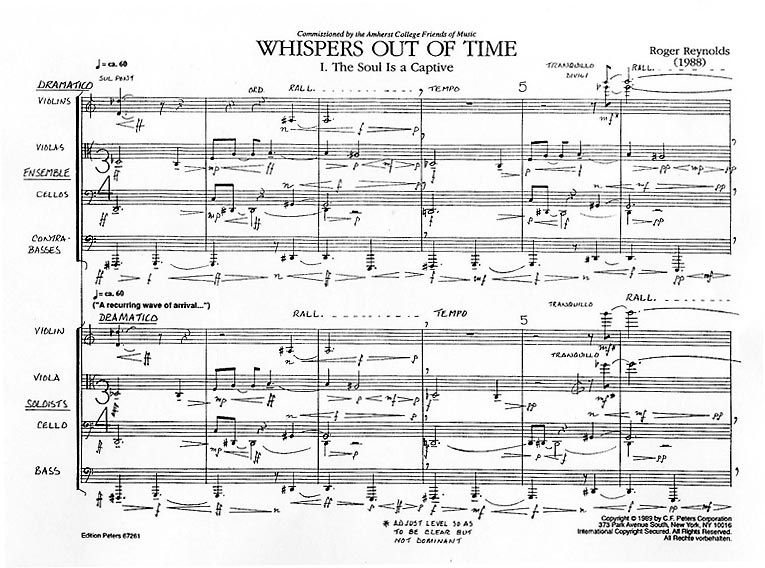 BD: Of course. This is why I never ask about
what a certain piece means, but how do we get there, or what kinds of ideas
are in your mind as you are working on them.
BD: Of course. This is why I never ask about
what a certain piece means, but how do we get there, or what kinds of ideas
are in your mind as you are working on them.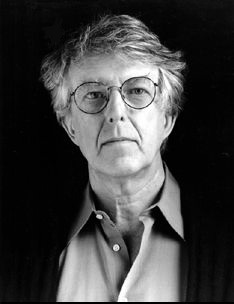 RR: Serious attention. And, as you mentioned
earlier, the idea of hearing a piece repeatedly is a practice that's necessary.
I could ask you, or anyone who's speaking about the arts, would you really
be satisfied writing work that could be fully appreciated on one hearing?
Is this a conceivable aim? Does even the most crass of popular songs
aim to be fully exhausted on one hearing? I doubt it.
RR: Serious attention. And, as you mentioned
earlier, the idea of hearing a piece repeatedly is a practice that's necessary.
I could ask you, or anyone who's speaking about the arts, would you really
be satisfied writing work that could be fully appreciated on one hearing?
Is this a conceivable aim? Does even the most crass of popular songs
aim to be fully exhausted on one hearing? I doubt it. BD: Are you going to be giving up a little bit of
the teaching in order to get more time for the composing?
BD: Are you going to be giving up a little bit of
the teaching in order to get more time for the composing?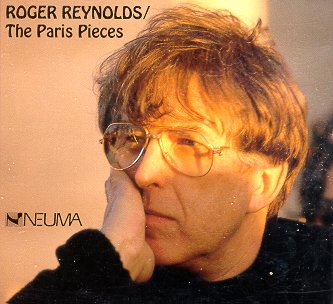 RR: I've been fortunate
in that most of the recordings have been made without any direct involvement
of mine, which is to say they've been made because the performers wanted
to make them. They have not been the result of a sort of vanity press
situation, where one cajoles people before a microphone in hopes of capturing
something. The players who have played my music on records have normally
been players that were committed to it, and I feel very privileged that there's
actually quite a few pieces out. The way in which I'm not very satisfied
is that my larger-scale works tend not to be recorded because of financial
difficulties. For example, in the late '60s Ozawa did a really amazing
performance in Japan of an orchestra work. It was recorded by Victor
and it was going to be released around 1969 or '70. But he changed
to Angel Records at that point, so it evaporated. [Threshold, for orchestra (1968); first
performance 7 June 1968 at Orchestral Space '68, Tokyo, performed by the
Japan Philharmonic, dir. Seiji Ozawa]
RR: I've been fortunate
in that most of the recordings have been made without any direct involvement
of mine, which is to say they've been made because the performers wanted
to make them. They have not been the result of a sort of vanity press
situation, where one cajoles people before a microphone in hopes of capturing
something. The players who have played my music on records have normally
been players that were committed to it, and I feel very privileged that there's
actually quite a few pieces out. The way in which I'm not very satisfied
is that my larger-scale works tend not to be recorded because of financial
difficulties. For example, in the late '60s Ozawa did a really amazing
performance in Japan of an orchestra work. It was recorded by Victor
and it was going to be released around 1969 or '70. But he changed
to Angel Records at that point, so it evaporated. [Threshold, for orchestra (1968); first
performance 7 June 1968 at Orchestral Space '68, Tokyo, performed by the
Japan Philharmonic, dir. Seiji Ozawa]| Roger Reynolds (b.1934) Roger Reynolds was educated in music and science at the University of Michigan. His compositions incorporate elements of theater, digital signal processing, dance, video, and real-time computer spatialization, in a signature multidimensionality of engagement. The central thread woven through Reynolds' uniquely varied career entwines language with the spatial aspects of music. This center first emerged in his notorious music-theater work, The Emperor of Ice Cream (1961-62; 8 singers, 3 instrumentalists; text: Wallace Stevens), and is carried forward in the VOICESPACE series (quadraphonic tape compositions on texts by Coleridge, Beckett, Borges and others), Odyssey (an unstaged opera for 2 singers, 2 recitants, large ensemble, multichannel computer sound; bilingual text: Beckett), and JUSTICE (1999; soprano, actress, percussionist, computer sound and real-time spatialization, with staging; text: Aeschylus). 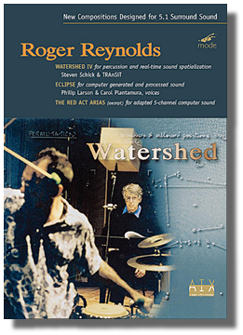 In addition to his composing, Reynolds' writing, lecturing, organization
of musical events and teaching have prompted numerous residencies at international
festivals. He was a co-director of the New York Philharmonic's Horizons '84,
has been a frequent participant in the Warsaw Autumn festivals, and was commissioned
by Tōru Takemitsu
to create a program for the Suntory Hall International Series. Reynolds' regular
masterclass activity in American universities also extends outward: to the
Sibelius Academy in Helsinki, Ircam in Paris, the Central Conservatory of
Music in Beijing, to Latin America and Asia, to Thessaloniki. His extensive
orchestral catalog includes commissions from the Philadelphia, Los Angeles
and BBC Orchestras.
In addition to his composing, Reynolds' writing, lecturing, organization
of musical events and teaching have prompted numerous residencies at international
festivals. He was a co-director of the New York Philharmonic's Horizons '84,
has been a frequent participant in the Warsaw Autumn festivals, and was commissioned
by Tōru Takemitsu
to create a program for the Suntory Hall International Series. Reynolds' regular
masterclass activity in American universities also extends outward: to the
Sibelius Academy in Helsinki, Ircam in Paris, the Central Conservatory of
Music in Beijing, to Latin America and Asia, to Thessaloniki. His extensive
orchestral catalog includes commissions from the Philadelphia, Los Angeles
and BBC Orchestras.In 1988, perplexed by a John Ashbery poem, Reynolds responded with Whispers Out of Time, a string orchestra work which earned him the prestigious Pulitzer Prize. Critic Kyle Gann has noted that he was the first experimentalist to be so honored since Charles Ives. Reynolds' writing -- beginning with the influential book, MIND MODELS (1975), and continuing, most recently, with FORM AND METHOD: Composing Music In 1998, Mode Records released WATERSHED, the first DVD in Dolby Digital 5.1 to feature music composed expressly for a multichannel medium. "As in all art making, there is a kind of 'alchemy' going on [producing] a richly nuanced and authentic result," wrote Richard Zvonar in Surround Professional. In the same year, The Library of Congress established the Roger Reynolds Special Collection. Writing in The New Yorker, Andrew Porter called him "at once an explorer and a visionary composer, whose works can lead listeners to follow him into new regions of emotion and meaning." (2002) Reynolds has also appeared widely in Asian, American and European journals. Reynolds' music, recorded on Auvidis/Montaigne, Lovely, New World, Pogus, and Neuma, among others, is published exclusively by C.F. Peters Corporation, New York. |
This interview was recorded in Chicago on December 12, 1989.
Portions (along with recordings) were used on WNIB in 1994 and 1999.
A copy of the unedited audio was placed in the Archive of Contemporary Music at Northwestern University. This transcription
was made and posted on this website in 2010.
To see a full list (with links) of interviews which have been transcribed and posted on this website, click here. To read my thoughts on editing these interviews for print, as well as a few other interesting observations, click here.
Award - winning broadcaster Bruce Duffie was with WNIB, Classical 97 in Chicago from 1975 until its final moment as a classical station in February of 2001. His interviews have also appeared in various magazines and journals since 1980, and he now continues his broadcast series on WNUR-FM, as well as on Contemporary Classical Internet Radio.
You are invited to visit his website for more information about his work, including selected transcripts of other interviews, plus a full list of his guests. He would also like to call your attention to the photos and information about his grandfather, who was a pioneer in the automotive field more than a century ago. You may also send him E-Mail with comments, questions and suggestions.